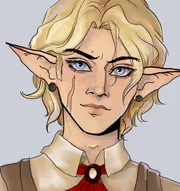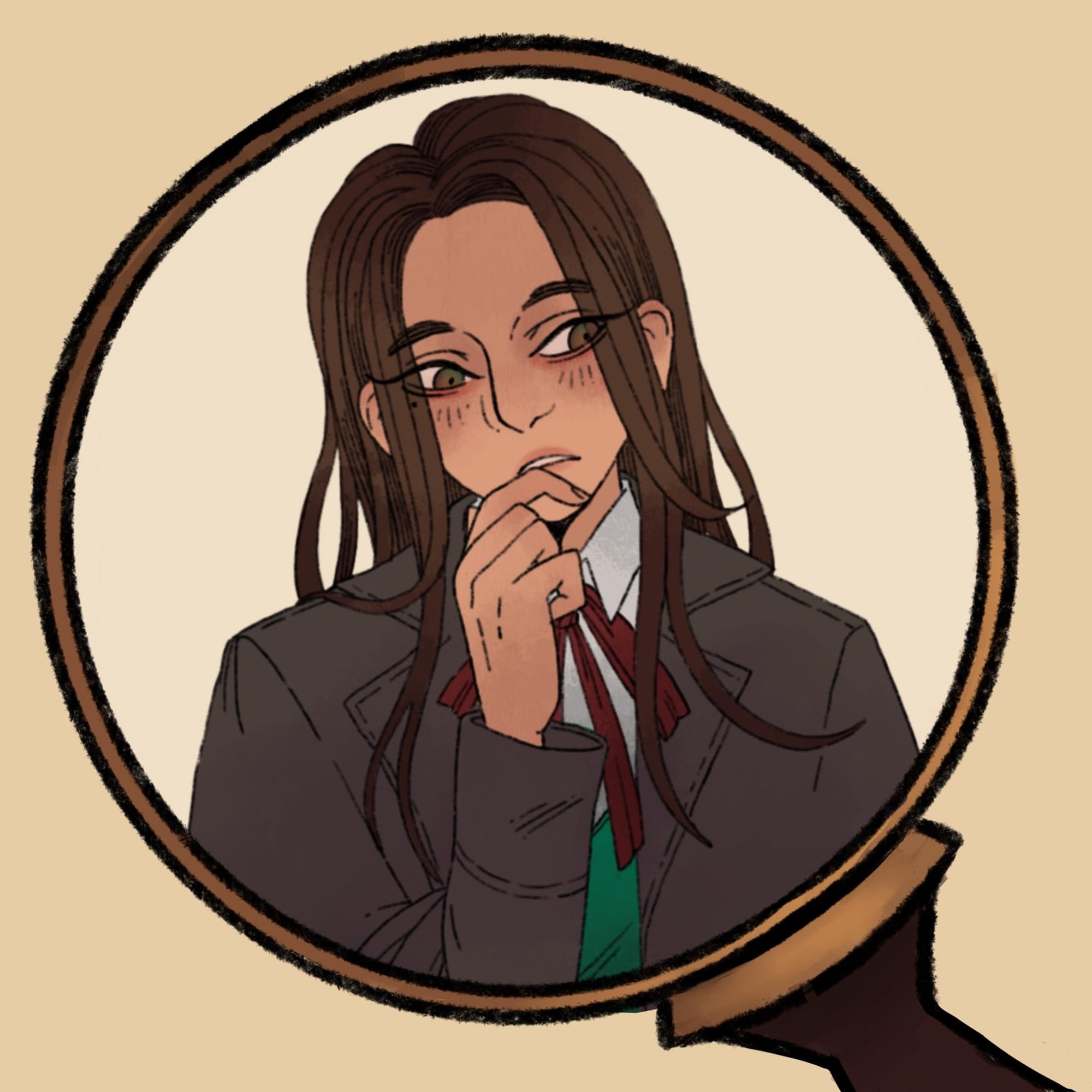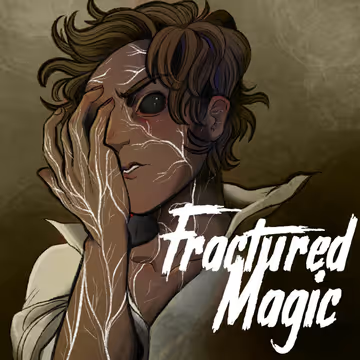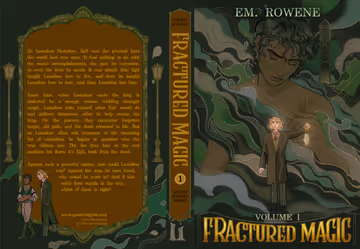Fractured Magic: Chapter Fourteen
Roman and Maebhe make their way into the prison.
Fractured Magic is a fantasy webserial about political and personal accountability, ghosts both figurative and literal, and a pair of estranged friends who act like they’ve gone through the world’s messiest divorce.
The tunnels continued to contract as they walked, eventually reaching a point where Maebhe and Roman had to stoop to avoid hitting their heads. Despite that, Maebhe didn’t feel claustrophobic; sunslight splashed off the walls ahead, though the curve of the tunnel blocked Maebhe’s view of its source.
Roman explained their route as they walked. “Picture Unity Island as a crescent. At one end is the courthouse and clock tower, at the other Unity’s prison. The bridge connects at the innermost curve of the crescent,” he said. In the dim light, Maebhe could just make out him mapping the curves with his free hand while he spoke, the other still bearing the lantern. “The further you get from the clock tower, the fewer buildings you’ll find. All that surrounds the prison in the north are fields and watchtowers, so there’s no way to approach from ground-level without being seen.”
“So we’re approaching them from…not ground level?” Maebhe asked.
Roman smiled at her as they passed under a grate, streaks of sunslight flashing over his features. Maebhe wondered why he kept whispering—what was above their heads right now? Some important Unity building or another? When she’d toured the island with Kieran and Íde, she’d been shocked at how many there were. She couldn’t even guess at what they were all for.
“Good catch,” Roman said. “The prison itself is made up of several buildings—administrative offices, inmate housing, the caféteria and laundry facilities, and so on. In the complex, there’s also barracks. The Unity soldiers who live inside come and go at odd hours and can’t always use the public bridge. Three guesses which route they take.”
He’d stumbled strangely over the word soldier, as if he’d meant to use a different one and swapped it out at the last second. Unable to stop herself, Maebhe glanced over her shoulder, half-expecting to see one of these “soldiers” lurking in the shadows.
“So if you take their path to the barracks, you can get from there to the prison,” Dinara guessed, not sounding pleased about any of it. “That’s what you’re getting at?”
“Exactly. The barracks connect to the main block via a skyway, so that’s our access point,” Roman said, pretending not to notice Dinara’s tone. When they passed under another grate and that brief flash of sunslight came again, though, Maebhe noticed his furrowed brow.
“I thought Unity didn’t have a standing army,” Maebhe pointed out. “You just call on the armies of the nations pledged to you. I learned about that in school.”
“They’re not an army, they’re just...fighters. Very strong ones,” Roman said.
“Whatever they are, how is marching through their barracks in any way a good idea?” Dinara asked. “What will you do if they catch you?”
“Fight back, I suppose.”
Beside Maebhe, Ivey murmured something fervently under his breath. It sounded suspiciously to Maebhe like a prayer.
“Fight the strong fighters?” Dinara clarified. “That’s your plan?”
“Don’t make it sound so dire. They’re strong, not unbeatable,” Roman said, clearly trying to convince himself as much as he was Dinara. “At this time of day, there should only be a few of them around. If we’re lucky, the rest are out on missions or attending to business.”
Missions, he said, like they were spies of some kind. Fight, he said, like Maebhe could do any such thing.
“This is going to be dangerous,” she said. Logically, she’d known that from the start. But if the smuggler who defied Unity for a living was nervous, touching each on a string of beads while he prayed under his breath, if Roman was nervous, with all Maebhe knew about him—then she was afraid.
“Yes,” Roman said, simply. Those splashes of sunslight had turned to a steady stream now, steeping them in it, but shadows cut across Roman’s face. His brows were drawn together, casting shadows that made him look like a different person entirely.
When they rounded a final bend, Maebhe held up a hand to shield her eyes, suddenly confronted with the pale, blinding sky. Past a gated drainage pipe was the sea and its horizon, storm water running past their ankles to empty into the sea ahead.
“Here we are. Ivey?” Roman asked.
Rifling through his bag, Ivey withdrew a small roll of tools and passed it to Roman. While Roman withdrew two long, narrow needles and turned his attention to the lock on the gate, Maebhe pressed herself against its bars, trying to see directly below them. What she found was a five-foot drop to a beach, where a rocky stream actually carried the water to the sea. Suddenly, the lock clicked and the door Maebhe was leaning against gave. She nearly fell, but Roman caught one of the bars, keeping the door shut before she could plunge headfirst into the stream she’d been trying to see. She laughed breathlessly. “Ah, sorry.”
With a snort, Roman passed his lantern to Dinara, who took it with the same disapproving frown she’d been wearing since she saw the lock-picking tools, and held his hand out for Ivey’s satchel. “Wait here for us. If we’re not back in two hours, leave. Don’t look for us.”
“As you wish,” Ivey agreed.
“How can you say that?” Dinara asked. “What am I supposed to do if you just disappear?”
Roman sighed. “Try Gareth. If we’re caught, he might be able to help Maebhe, at least,” he said. Before Dinara could argue, he kissed her cheek and then was gone, hopping down to the beach and carrying on without waiting for Maebhe to catch up.
Maebhe tried for an encouraging smile. “I’m sure we’ll be fine. He seems to know what he’s doing.”
“As if that’s not worrying in its own way,” Dinara sighed.
Unsure what more she could say, Maebhe patted Dinara’s shoulder and jumped down as well, landing far less smoothly than Roman had and almost losing her balance on the slippery rocks. She heard the gate creak shut behind her.
“We’ll keep this way unlocked,” Ivey called, as loud as he dared. “Be quick, before any Enforcers pass through.”
Roman waved over his shoulder as Maebhe picked through the water after him. She craned her neck as she went; the two of them walked along a sheer cliff face, bracketed on the other side by the endless sea. “Where are we?” she asked. From here, though, she couldn’t see the mainland, and that told her enough.
“The outside of the crescent,” Roman confirmed. He pointed behind them. “The clock tower is that way, which means we’re headed in the right direction.”
Maebhe looked back the way he pointed, but she couldn’t see any sign of the tower—just rock and sky. Obviously, he’d been this way before, enough times to have the route memorized. “These soldiers—or Enforcers, was it? How do you know about them?” Maebhe asked. It was the only explanation that made sense.
She thought she saw Roman wince. “I was one of them, once.”
“That’s the workplace Ivey helped you escape?”
“Hm. Clever,” Roman said. “Exactly right. Once you become an Enforcer, you can’t exactly quit, but Ivey helped me get away.”
“And now you’re back.”
“Now I’m back,” Roman agreed. “Put your hood up, Maebhe.”
Maebhe scrambled to cover her ears again, though onlookers from above were unlikely. With the cliff’s magnitude, you’d have to be standing toes to the edge, looking straight down, to spot them. Even so, they kept as close to the rocks as they could, staying in the cliff’s shadows.
“You said that if they catch us, Gareth might be able to help me,” she said, eager to keep the conversation going. “No hope for you, then?”
Roman laughed humorlessly. “If they catch us, I won’t be alive for Gareth to help.”
“Those sound like bad colleagues,” Maebhe said. She gave him a sly look, then added, “But all that makes sense, if you really are—”
“Watch it,” Roman warned, shooting her a knowing look back. “I know where you’re going with that. My price for helping you, Maebhe Cairn, is that you ask no more questions.”
Maebhe bit her lip. She managed to keep quiet for about ten seconds, then asked, “No more questions at all? Not even about the prison? Or our plan for getting Kieran and Íde? What if there’s something I need to know for our mission?”
“Is there?” Roman asked.
“Why doesn’t Dinara know about any of this? Aren’t you together?”
“That has nothing to do with our mission,” Roman pointed out.
“Then tell me more about the Enforcers. I can tell you’re afraid of them. Should I be worried?”
“I am afraid of them,” Roman admitted, his voice soft, “But you don’t have to be. As long as you stay behind me, I’ll keep you safe.”
Maebhe believed him. She thought maybe she shouldn’t, but she did. Back in Orean, they had their own stories. They had their own heroes. Roman fit so naturally among them that it was natural, too, for Maebhe to put her faith in him. It was like following a familiar script, coloring within bold lines—of course it was easy.
“I’ll tell you this about the Enforcers: they’re Unity’s best kept secret, and they’ll go to great lengths to keep it secret. They’d kill you for even knowing they exist.”
“Seems like they’d kill me just for being orinian, too.”
Roman sighed. “You may be right.”
“Can I ask one last question? No more prying into secrets, I promise.”
“That was a question,” Roman pointed out, lips twitching when Maebhe rolled her eyes. “Fine. But if I don’t like it, I’m not answering.”
“Your prerogative. I was just wondering...why are you really helping me? It would’ve been easy for you to just leave me where you found me. You didn’t have to help.”
Roman sighed. “To tell you the truth, I didn’t want to. I hate this feeling—the weight of someone else’s trust in my hands, the heavy steps out of safety and into danger. And I hate knowing that if I fail, I’m failing both of us. It’s terrifying, and you’re right: the coward’s choice would be easier. The coward’s choice is always easier, but it’s also the one they want us to make—everyone out there looking to hurt us. As long as I’m alive, I won’t give them the satisfaction. So I did have to help, in a way—for both me and for you, and for a future without them,” he said. “Besides, regret weighs heavier than fear, and I know which choice lets me sleep at night.”
Maebhe dropped her gaze, watching the sand shift and cling to her wet boots. “I understand,” she said. She didn’t, not really, but she’d never had to make the selfless choice or fight enemies like this. Rescuing Kieran and Íde was the closest she’d come, but it was still Roman doing all the work, and it was as much for herself as for them.
As they circled the island, the strip of beach narrowed until they could no longer walk side by side. Maebhe, who kept looking up at the cliff’s face as they went, waded more than once into the water by accident. To distract herself from why they were here, she’d turned to focusing on where they were, as if this was just another tour. It struck her how excellent this spot would be for cliff diving. The water was deep, free of visible obstacles, the cliff jutting out above to provide a good jumping point. If she had to guess, she’d call it seventy feet: less than her record, but pushing her comfort range.
She loved the rush of adrenaline, the fear of falling. It certainly beat what she felt now, this knotted and tangled terror. It was wilder, freer. The anticipation made it worse. She thought it just might kill her until finally, a sinister-looking gray building appeared over the cliff’s crest. It grew and grew until it loomed high above them. Ears flat to her head, Maebhe asked, “We’re breaking into that?”
“That is the cafeteria,” Roman corrected. “The main block is behind it.”
They rounded a sharp bend and moved into the inner curve of the island’s crescent. Maebhe could see the mainland in the distance, now, and Unity’s bridge arching over the water. Looking up at it from below, it seemed much larger. “How do we get from down here to up there? Are we supposed to scale the wall?”
“You’ll see,” was all Roman said. His hand never strayed far from his sword, now.
And she did. Just before the strip of beach ended entirely, they came upon a narrow opening in the rock, hidden behind sharp outcroppings. Maebhe grimaced when she saw it, but reluctantly followed Roman into the creepy cave. To her surprise, she found that it wasn’t so creepy on the inside, after all. Lit from above by orangeish industrial lights, the walls were smooth, the cave clearly man-made. She and Roman stepped up onto dry cement and toward a rusty service elevator built into the far wall.
Roman frowned at it. “That wasn’t here in my day.”
“Really? It looks ancient.”
Roman hummed. Instead of the elevator, he made for the stone steps beside it. They appeared to climb up without end—for at least seventy feet, if Maebhe had to guess. “Is there a reason we’re not taking the elevator?”
“That thing looks loud enough to alert the entire island to our presence,” Roman whispered. “We don’t know who might be waiting at the top.”
Cowed, Maebhe followed him without further complaint, ears still flat to her head. After a climb that seemed to last ages, the stairs led to a tidy cellar, the cellar to another short flight of stairs that ended in a closed door. Roman stopped at the bottom of those stairs, his hands clenching into fists and unclenching at his sides. Unsure what else to do, Maebhe waited several paces back, watching him with wide eyes.
“I’m sorry,” he said finally, with a short, self-deprecating laugh. “It’s been some time since I was last here.”
“Take your time,” Maebhe said, trying to sound encouraging. While she’d never been good with vulnerable emotions, either expressing or witnessing them, she wanted to help him for all that he was helping her.
Roman squeezed his eyes shut. By the time he opened them again, the vulnerability was gone. He rolled his shoulders, gestured for Maebhe to wait, then started up the stairs alone. Maebhe watched as he eased the door open, peered cautiously around it. Her tail lashed back and forth behind her, the suspense too much.
Then Roman was gone, leaving Maebhe alone, and this commonplace cellar suddenly felt much scarier. Maebhe waited thirty whole seconds, counting in her head, before deciding she couldn’t wait any longer. She hurried up the stairs, boots quiet on the old stone, and mirrored Roman’s earlier position, peering cautiously around the door just in time to see Roman ease a body to the ground. He cushioned the woman’s head as he laid her down; some comfort, as it meant she must be alive.
Maebhe knew killing might be required—had known it more from the look in Roman’s cold eyes than anything he’d said—but she didn’t want to see it. She didn’t even want to know about it. Maybe that was selfish, expecting Roman to kill for her while she looked the other way.
She crept slowly into the room, trying to see the girl’s face. She was just that: a girl with sweet features, barely twenty and dressed in a utilitarian vest-trousers combination. A perfectly normal-looking person. Now that Maebhe considered it, everything about this place looked normal. Too normal. She eyed the bland common room, plainly furnished and lit by narrow windows. The strangest thing was the table before Roman, which sat full of half-assembled weapons. The girl must have been standing at it when Roman snuck up on her.
Maebhe watched him while he watched the girl at his feet. He slowly drew his sword, inch by inch.
Maebhe knew he intended to kill her, and she was struck by the urge to stop him—or at the very least, to stand by his side while he did it. Staying back was the coward’s choice, and Roman had already made the selfless one to come here for her. Whatever else happened, he shouldn’t have to face it alone.
On her next step into the room, though, the floor creaked. It was barely audible, even to her own ears, but Roman whirled to face her, his sword drawn between one moment and the next. His wild expression eased when he saw Maebhe, but then his eyes widened. “Maebhe!”
Maebhe didn’t need the warning; her ears had picked up the telltale swish of fabric behind her. She dove forward on instinct, hitting the ground and rolling while Roman leaped over her. She heard the clang of metal striking metal, and by the time Maebhe got her bearing and spun around, Roman was facing off against a tall, broad man with dark mutton chops, their swords locked.
Aside from the sword in his hand, this man was also utterly unassuming. Uncannily so. If Maebhe had passed him in the street, she would’ve thought him some sort of workman—not a spy or an assassin, or whatever else the Enforcers may be. Just who were these people?
“Who in the hells are you?” the man asked, looking between Maebhe and Roman with what Maebhe would call mild irritation, as if they were ants in a kitchen. His gaze flicked from Maebhe’s ears to her birthmarks to her tail, cataloguing her orinian features.
Roman laughed and shoved at their crossed blades, the strength behind it forcing the man back a step. His eyes widened. Grinning and brandishing his sword, Roman said, “If you were smart, you’d keep your eyes on me. You’re far too outmatched to get distracted in this fight.”
Thank you for reading! If you’d like to support the story, the best thing you can do is share it with others. You can also support the author with a one-time tip, or get perks in one of two membership tiers:
$2/month - Receive a behind-the-scenes newsletter that includes character art, exclusive content and updates, writing advice, and more.
$5/month - In addition to the above newsletter, receive chapters one week early.




Discussion